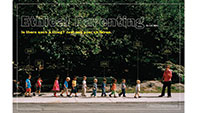
1. In a wide-ranging interview with Jennifer Senior, Supreme Court justice (and conservative icon) Antonin Scalia held forth on originalism and gay rights, the childishness of D.C. politics, the coarsening of our culture, and his belief in the Devil (“In Conversation: Antonin Scalia,” October 14). Certain snippets of the interview, such as Scalia’s horror at females who curse or suspicions that he has gay friends garnered a great deal of attention (author Teju Cole mockingly tweeted, “I have friends that I know, or very much suspect, are heterosexual. Everybody does”; “He’s Archie Bunker in a less comfy chair,” wrote Ian Millhiser at Think Progress). But the point that many found most disconcerting was the justice’s description of his own ideological bubble (he listens to conservative talk radio, doesn’t read the New York Times, and subscribes to the Washington Times but not the Post). “Scalia explains how stimulated he was by dissenting opinions from his liberal former colleague John Paul Stevens,” noted Michael McGough at the Los Angeles Times. “So why refuse to lay eyes on the Washington Post? Maybe his liberal clerk should buy him a subscription.” “The trouble is not that Scalia doesn’t read the newspapers that make him angry—he’s old enough that he doesn’t need any civics lectures about the merits of hearing another side—it’s that he excludes them while including movement organs that are chiefly going to tell him what he wants to hear,” wrote Daniel McCarthy at the American Conservative. “What he wants to hear is what the movement has to say. If the conservative movement in America were a more edifying thing, that wouldn’t be so bad, but again, consider its recent record. What does it say about a man that he identifies with the movement in this way?” “He has managed to shutter himself off from the world of his critics and intellectual opponents. He seems a bit like a man living on a tiny remote island of the Supreme Court, and even on that tiny island, he’s forever more alone,” wrote Dahlia Lithwick at Slate, who noted the tellingly bipolar way the interview was received (applause from conservatives and sneers from liberals). “Scalia seems to have virtually completely immunized himself from contact with progressive ideas, progressive arguments, and progressive progressives. This interview encapsulates the nearly complete polarization of political discourse. [Senior] can’t believe this man (or any man in 2013) has grandchildren who still think homosexuality is morally wrong. He can’t fathom that she’s never met anyone who believes in the devil. Part of this is probably generational. Part of it is gender. But at least a part of it is the absolute polarization of American life: the complete intellectual silos that are our neighborhoods, our media, our friends, and our intellectual sparring partners. The Scalia interview is an amazing tell into all the ways Washington has changed. We don’t know the other side anymore. We don’t even know anyone like the other side anymore. We can’t even believe those people exist anymore. And maybe this is really what the devil’s been up to.”

2. “Parenthood, like war, is a state in which it’s impossible to be moral,” wrote Lisa Miller in an essay on what parents are teaching, exactly, when they hustle to give their kids advantages while shrugging off misgivings about competitive child-rearing (“Ethical Parenting,” October 14). Some readers were horrified by examples of misbehavior in the story—“I’m shocked at how truly screwed up these parents are!” wrote one commenter at nymag.com; “People who make Machiavelli look like Mother Teresa,” added another—but most were more generous. “In all areas of life, it’s hard being a moral individual,” wrote Brian Gresko at Babble. “I believe that most parents try to do the best they can to help their kids, though they sometimes make bad decisions despite these good intentions. Hey—what can you do? We’re all fallible human beings, and so were our parents, and their parents before them. Miller might be giving her tale of woe a contemporary, upper-class Manhattan spin, but there’s nothing new here. Parents are as uneven in their ethics—prone to corruption, favoritism, and hypocrisy—as humans have been since the dawn of time.” Other readers zeroed in on what they saw as the essay’s New York focus. “Her theory for why this is happening—that we live in an age of a constricting middle class, where opportunities for success, or even solvency, are slippery at best—rings true,” wrote Jessica Grose at Slate’s XX Factor blog. “Parents feel they must do everything they can to get their kids onto ever-shrinking safe ground. That said, I don’t think raising children in most places is as cutthroat, nasty and, yes, unethical as it is in New York City. A few years ago, I got an impassioned e-mail from an acquaintance who had moved from city to suburb and back. In the suburbs, she could just roll her kids on down to the public school without jockeying to get into the ‘right’ one. Resources weren’t so scarce up there. Things were easier. Perhaps the answer, then, is to leave New York City if you want to be an ethical parent—and raise ethical kids.”
Send correspondence to: nymletters@nymag.com